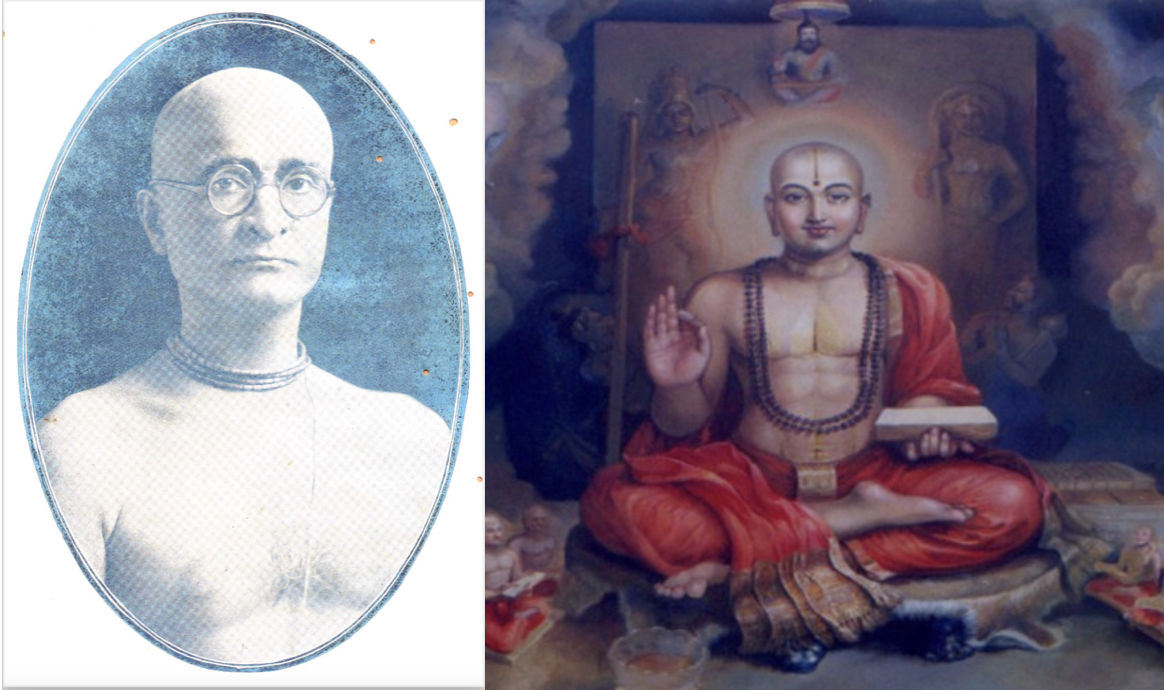Śrī Madhva-muni "Prāṇanātha –Lord of our Life Airs”

Excerpts from the writings of Śrīla Bhaktisiddhānta Sarasvatī Ṭhākura
Prabhupāda Śrī Śrīmad Bhaktisiddhānta Sarasvatī Ṭhākura Gosvāmī glorifies Śrī Pūrṇa-prajña Madhvācārya-pāda as follows:
“In Śrī Brahma-vaivartta Purāṇa, in the fourth chapter of Śrī Kṛṣṇa-janma-khaṇḍa, we see that Vaikuṇṭha-dhāma and Goloka-dhāma are both eternally sheltered and held up by Vāyu, the god of wind. In Devī-dhāma (this world, the Goddess Durgā’s realm) there is a Vāyu referred to as a Maruta-deva, whereas in Vaikuṇṭha, it is the orignal Vāyudeva himself who is eternally engaged is the service of holding up Vaikuṇṭha. Needless to say, the material element of wind, or the Marud-deva of Deva-loka, is not comparable to Vaikuṇṭha’s transcendental Vāyudeva:
vaikuṇṭhaṁ paramaṁ dhāma jarā-mṛtyu-haraṁ param|
vāyunā dhāryamāṇañca brahmāṇḍād-urddhvam-uttamam||
na varṇanīyaṁ kavibhir-vicitraṁ ratna-nirmmitam |
[Vaikuṇṭha is the supreme abode; it is supreme for it eradicates old age and death. Vāyu, the god of Wind, holds up this highest point above the material universes. That place is indescribable, even by poets, an abode wondrously made of jewels.]
“Goloka-viṣaye urddhvam vaikuṇṭho ’gamyaṁ evaṁ vāyunā dhāryamāṇañca nirmmitam svecchayā vibhoḥ - As for Goloka, which is higher than Vaikuṇṭha, that too is upheld by Vāyu and devised as such by the personal will of the Lord.” This and other statements from Brahma-vaivartta Purāṇa inform us of Vāyu’s service to Śrī Nārāyaṇa by holding up the abode of Vaikuṇṭha-dhāma. The followers of Śrī Madhva say that their ācārya-pāda is an avatāra of Vāyu, and so they have given Śrī Madhva the title ‘Prāṇanātha’.”
[Translated from Śrī Gauḍīya Patrikā, Year 1, Issue 11, page 405.]
In 1924, in the 2nd volume, 28th issue of the Gauḍīya, in response to the heartfelt Vyāsa-pūjā offerings of his disciples, Śrīla Bhaktisiddhānta Sarasvatī Prabhupāda delivers a profound meditation on the omnipresence of śrī guru in all living creatures, beginning with the famous “vipada-uddhāraṇa bāndhava – my friends come to save me from calamity” term of address he used for his disciples:
“My Śrī Gurudeva is the manifester of pastimes as the āśraya-jātīya viṣṇu-vigraha (the omnipresent form of Viṣṇu as subject, or repository and agent, of prema). Though he is the form of Viṣṇu that is beloved to Bhagavān (bhagavat-priyatama viṣṇu-vigraha), in the form of the Vaiṣṇava, he is situated in this material realm within all living entities, for the purpose of elevating fallen wretches such as myself. In nara (human) form, which presents as the king of living creatures, he is my sole object of worship (upāsya-vastu). Though as narottama (topmost of humans), he is a Vaiṣṇava, or the servant of the supremely cherished object of all Vaiṣṇavas, he is a tattva (principle, truth) that is inconceivably one with and different from Śrī Gaurasundara.”
Further on in his address, he claims he has made offences at the feet of Śrī Viṣṇusvāmī by mistaking his śuddhādvaita philosophy for kevalādvaita. He diminishes himself further, saying he has been cheated of Śrī Vyāsa’s guidance and also made offences at the feet of Śāṇḍilya. Then he says:
“The much-needed aid that Śrī Pūrṇa-prajña Ṛṣi Ānanda-tīrtha Madhva-muni extends to me during these dark days by manifesting his servitude to Vyāsa is something I am truly incapable of expressing in the language of this material world.”
At the end of this heart-rending address, he again invokes Śrī Madhvācārya, saying:
“I am a jīva who is averse to Hari, so kindly help me by punishing my aversion to Hari and engaging my body, mind, and words in Śrī Vyāsa-pūjā. I am a small, insignificant prāṇī (creature), so I pray that I may never forget the guidance of my prāṇa-nātha (the lord of my life airs), Ānanda-tīrtha.”
[See Archive for full Vyāsa-pūjā address by Śrīla Sarasvatī Ṭhākura.]
